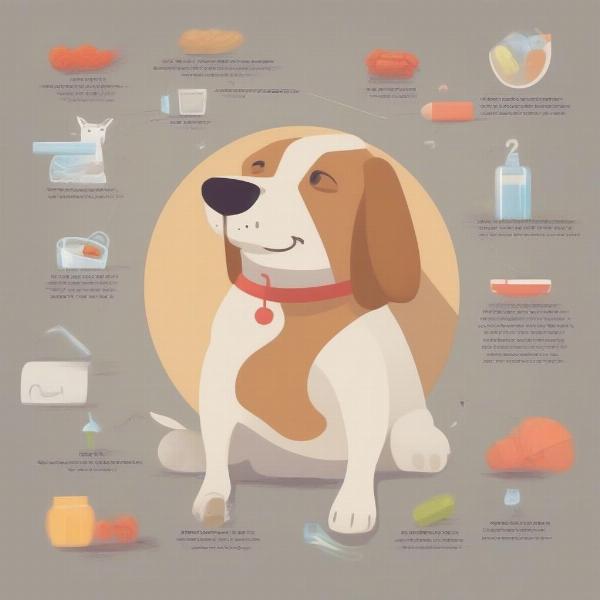Understanding your dog’s pooping habits is a vital part of responsible pet ownership. While a “dogs pooping calendar” might sound a bit unusual, keeping track of your dog’s bowel movements can be incredibly helpful in identifying potential health issues early. This article will delve into the factors influencing a dog’s pooping frequency, what’s considered normal, and when to seek veterinary attention.
Factors like diet, age, breed, activity level, and even stress can affect how often your dog poops. While there’s no strict “dogs pooping calendar” set in stone, most healthy adult dogs poop between one and five times a day. Puppies, with their faster metabolisms, may poop even more frequently. Consistency is key. A sudden change in your dog’s pooping schedule, especially if accompanied by other symptoms like vomiting, lethargy, or loss of appetite, warrants a trip to the vet.
Understanding the Factors Affecting Your Dog’s Pooping Frequency
Several factors contribute to how often your dog needs to eliminate. Let’s break down the key elements that can influence their “dogs pooping calendar.”
Diet and Hydration
The quality and quantity of your dog’s food directly impact their digestive system. A high-fiber diet can increase stool bulk and frequency, while a low-fiber diet might lead to less frequent bowel movements. Similarly, adequate hydration is crucial for healthy digestion. Dehydration can lead to harder stools and constipation, disrupting their regular pooping schedule.
Age and Breed
Puppies, as mentioned earlier, tend to poop more often due to their higher metabolic rate and smaller bladders. Senior dogs might experience changes in their digestive system, leading to variations in their pooping frequency. While breed doesn’t directly dictate a “dogs pooping calendar,” larger breeds generally produce more waste due to their size.
Activity Level and Stress
Active dogs often have faster metabolisms, which can translate to more frequent bowel movements. Conversely, a lack of exercise can contribute to constipation. Stress can also play a significant role. Changes in routine, travel, or new environments can upset a dog’s digestive system and affect their usual pooping habits.
Identifying Normal and Abnormal Pooping Patterns
While a rigid “dogs pooping calendar” isn’t realistic, understanding what’s considered normal for your dog is crucial. Consistency in frequency, form, and color is a good indicator of digestive health. Pay attention to any significant deviations from your dog’s established pattern.
When to Worry
Sudden changes in your dog’s “dogs pooping calendar,” such as increased or decreased frequency, straining, diarrhea, constipation, or blood in the stool, should be taken seriously. These could be signs of underlying health issues, ranging from dietary sensitivities to more serious conditions.
Maintaining a Healthy Pooping Schedule for Your Dog
While a “dogs pooping calendar” isn’t necessary, promoting healthy digestion is essential. Here are some tips to ensure your dog’s bowel movements stay regular:
- High-Quality Diet: Feed your dog a balanced, nutritious diet appropriate for their age and breed.
- Fresh Water: Always provide access to fresh, clean water.
- Regular Exercise: Ensure your dog gets enough physical activity.
- Stress Management: Minimize stress by maintaining a consistent routine and creating a calm environment.
- gps shock collars for dogs can be beneficial for maintaining a regular exercise routine.
 Tips for Healthy Dog Pooping
Tips for Healthy Dog Pooping
Conclusion
While a strict “dogs pooping calendar” isn’t the solution, understanding your dog’s individual pooping habits is crucial for their overall well-being. By observing their patterns, being aware of influencing factors, and knowing when to seek veterinary attention, you can help ensure your furry friend stays happy and healthy. Remember, consistency is key, and any significant changes warrant a check-up with your vet.
FAQ
- How often should a dog poop? Most healthy adult dogs poop between one and five times a day, but this can vary based on several factors.
- What does a healthy dog poop look like? Healthy dog poop is typically firm, brown, and log-shaped.
- Is it normal for my dog’s pooping schedule to change? Slight variations can occur, but significant or sudden changes should be investigated.
- When should I be concerned about my dog’s pooping habits? If your dog experiences diarrhea, constipation, straining, blood in their stool, or a significant change in frequency, consult your veterinarian.
- Can I use a “dogs pooping calendar” to track my dog’s bowel movements? While a strict calendar isn’t necessary, noting any significant changes can be helpful.
- How can I help regulate my dog’s pooping schedule? Provide a high-quality diet, fresh water, regular exercise, and a stress-free environment.
- Does a gps dog collar help with tracking my dog’s pooping habits? A GPS collar primarily tracks location, not physiological functions like pooping.
ILM Dog is your trusted partner in canine care, providing expert advice and resources on dog breeds, health, training, nutrition, grooming, and much more. We offer valuable insights into every aspect of dog ownership, from choosing the right breed to ensuring a healthy and fulfilling life for your furry companion. Our expertise covers a wide range of topics including training with a dog collar with shock, finding the right dog small collar, and even using an electronic dog leash for better control during walks. For personalized guidance and support, contact us at [email protected] or +44 20-3965-8624. ILM Dog is here to help you navigate the wonderful world of dog ownership.